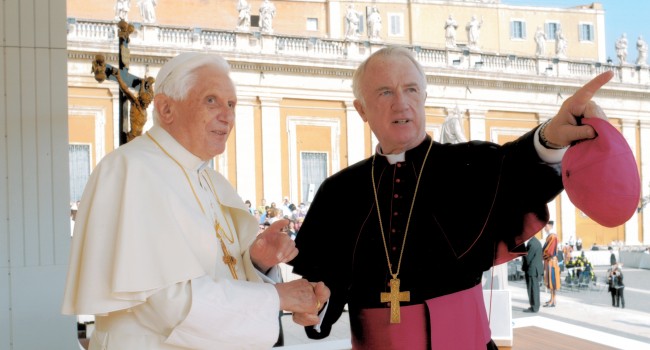MORGANTOWN — The Diocese of Wheeling –Charleston is again seeking dismissal of the state attorney general’s lawsuit alleging the diocese violated consumer protection law by failing to disclose that it employed priests who sexually abused children or had credible accusations of sexual abuse, and failed to conduct background checks for priests, employees and volunteers who had contact with children.
It calls Attorney General Patrick Morrisey’s suit “irresponsible” and “riddled with continuing misleading factual inaccuracies,” and it wrong applies consumer credit protection code to educational matters.
Morrisey, in a press release, responded that the motion “represents yet another attempt to sidestep transparency.”
The diocese and former Bishop Michael Bransfield are defendants in the case, filed in Wood County Circuit Court. The new motion follows the AG’s amended and expanded complaint, reported here previously.
The diocese says “staged media events and attendant press conferences cannot comb over the legal insufficiencies of his civil action.”
During the 45-year period covered in the complaint, the diocese says, its schools enrolled 326,000 students, employed 22,738 teachers and received the services of 36,358 volunteers. But the AG manages to cite only five abuse cases during the period. By comparison, a footnote says, “the public schools throughout the state of West Virginia are replete with allegations of sexual abuse and violence.”
The diocese cites several flaws in the case.
One, Morrisey alleges that the Safe Environment Program language on the diocese website violates the state Consumer Credit and Protection Act because the diocese previously failed to conduct some background checks and employed some priests who were abusers or were credibly accused.
But the CCPA applies to debtor-creditor relationships – credit sales, loans and leases – the diocese argues. While the schools provide for third-party payment plants, the schools are not liable for the lenders’ conduct and the plans are not actual credit because no interest is charged.
Two, the CCPA has a four-year “lookback” statute of limitations, and none of Morrisey’s allegations fall within that window.
Three, Catholic schools are regulated by an entirely different section of code, and where the CCPA references educations it’s referring to school loans.
Four, through the suit Morrisey seeks unconstitutional oversight of internal church child protection policies and compliance efforts. Quoting at length: “The essence of the claimed extension of regulatory authority is that because (it is alleged) five persons associated with schools in decades past (and one in 2012) had committed misconduct, not only are the religious schools presently unsafe but that ongoing regulatory authority is required for the future.
“Not only does this portend extensive present and future unconstitutional entanglement, but the very persistence of this litigation could act as a wedge between Catholic parents and the schools, parishes and Diocese, by inviting them to distrust Church leaders and abandon Catholic schools which are integral to faith formation in young people.”
Morrisey responded on Wednesday via press release and video statement. He argues again that much of the information was revealed, and remains relevant, because it came it response to subpoenas from his office.
“If you hide and conceal information for decades, then because of our subpoena, because of our complaint and it comes forward, that means that information’s not stale,” he said in the video.
He adds in the press release: “The Diocese’s latest
motion to dismiss represents yet another attempt to sidestep transparency as it
continues to conceal its investigative report on former Bishop Bransfield in
hopes to distract public attention from allegations that it employed
pedophiles, failed to conduct background checks and condoned Bransfield’s
alleged sexual harassment of employees and others.
“The Diocese did not issue its list of credibly accused priests until after issuance
of our first investigative subpoena in fall 2018, and continues to demonstrate
a pattern of concealing information until external pressure from our office and
the media forces its hand.
“It is past time for the Diocese to come clean. We reiterate our call for the
Diocese to release all relevant materials, including the Bransfield report. Not
only will this allow us to move this matter toward resolution; it is essential
for the Church to restore public trust.”
Tweet David Beard @dbeardtdp Email dbeard@dominionpost.com




